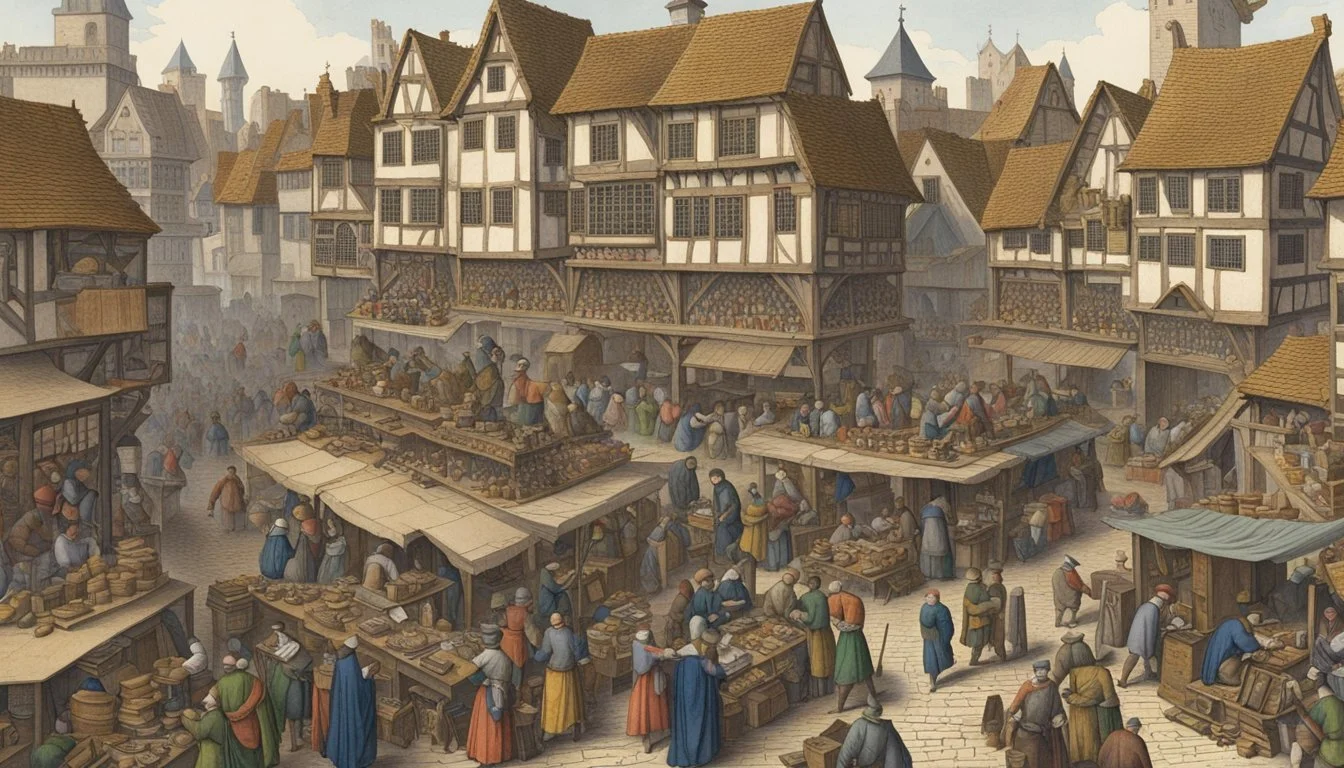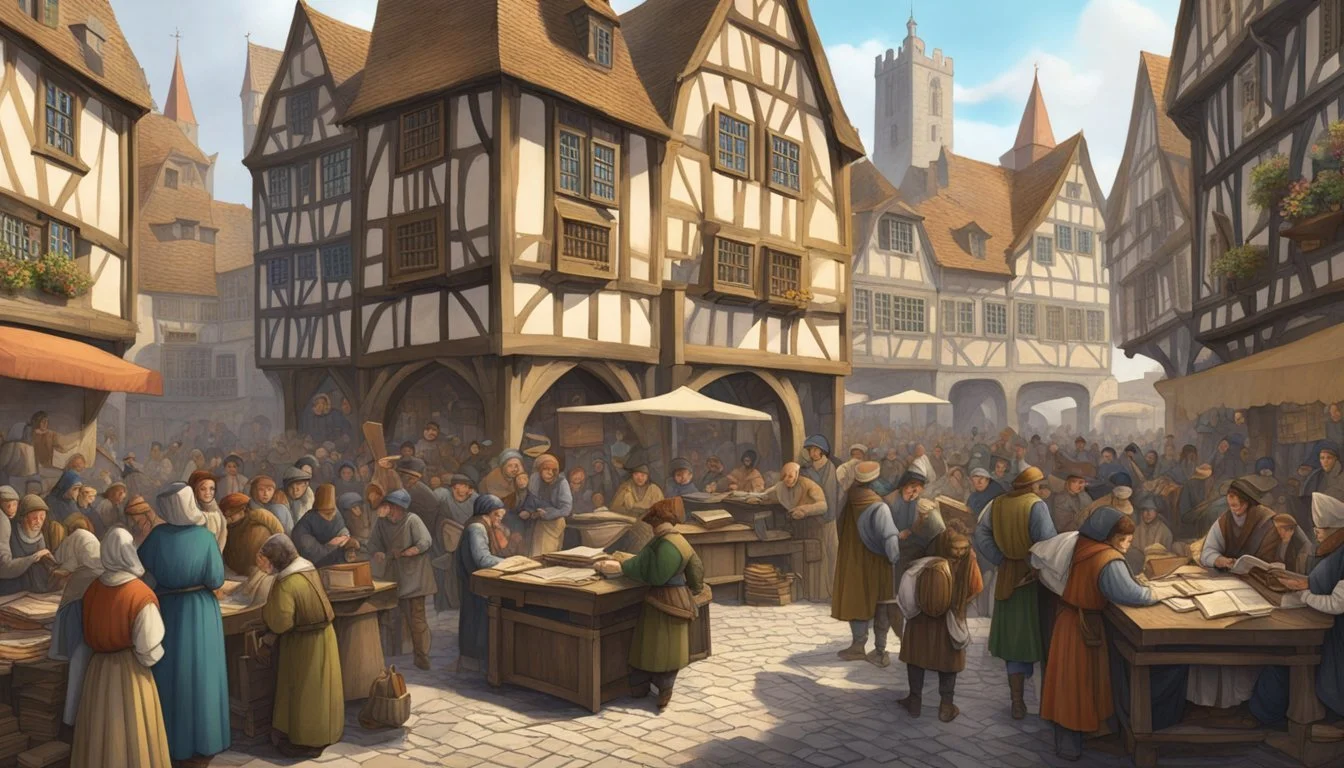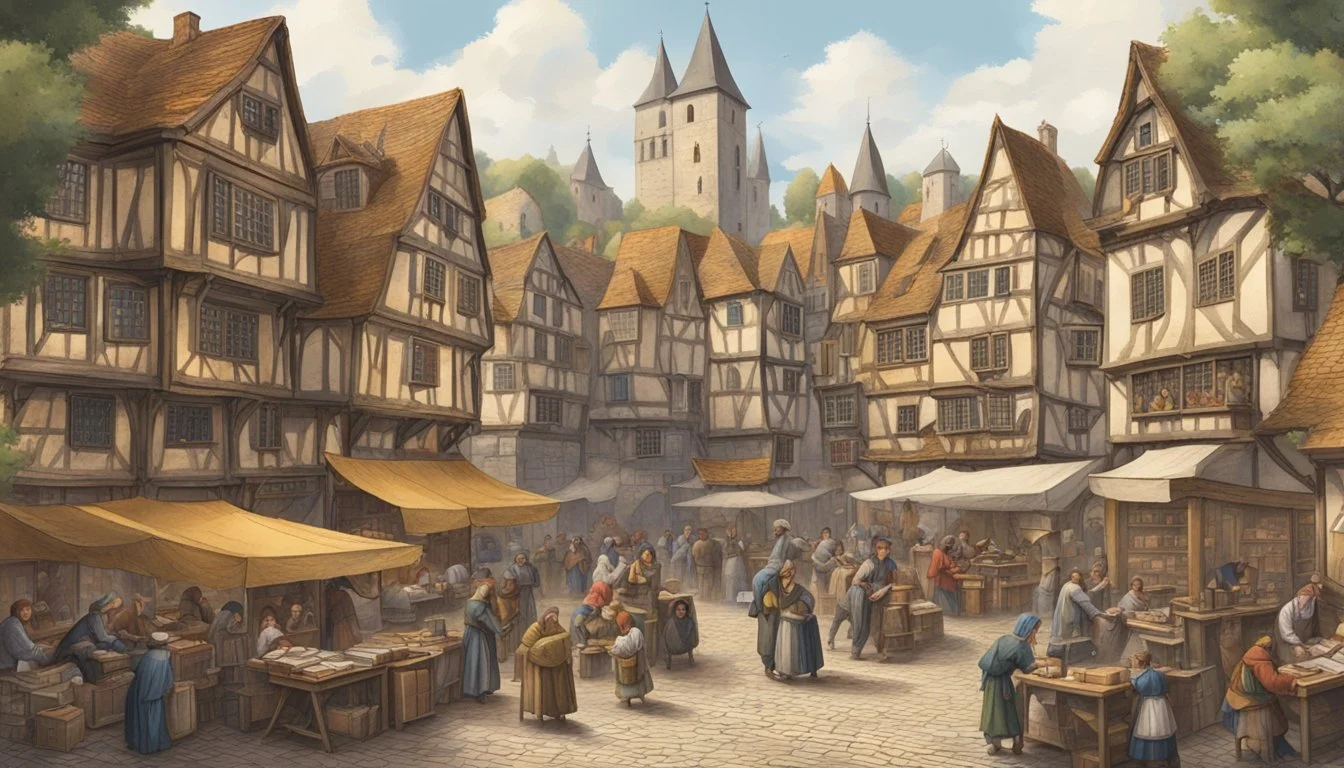8 Films Exploring the Impact of the Printing Press on Society
A Visual Journey Through Information Revolution
The invention of the printing press in the 15th century revolutionized the spread of information and ideas across Europe and beyond. This groundbreaking technology, developed by Johannes Gutenberg, made books and printed materials more accessible to the general public, leading to increased literacy rates and the dissemination of knowledge on an unprecedented scale.
Films exploring the impact of the printing press offer viewers a unique window into this transformative period in history. Through documentaries and dramatizations, audiences can gain insights into Gutenberg's innovative process, the technical aspects of early printing, and the far-reaching consequences of this invention on society, culture, and intellectual discourse. These films bring to life the story of how a single machine changed the course of human communication and learning.
1) Gutenberg: The Great Inventor (T. Ashmol)
"Gutenberg: The Great Inventor" is a documentary film directed by T. Ashmol that explores the life and work of Johannes Gutenberg. The film focuses on Gutenberg's revolutionary invention of the movable type printing press in 15th century Germany.
Ashmol's documentary examines the technical aspects of Gutenberg's invention, showcasing the intricate process of movable type printing. It highlights how this innovation dramatically increased the speed and efficiency of book production.
The film portrays Gutenberg as a visionary businessman of his era, navigating the challenges of medieval society. It depicts his determination and ingenuity in developing a technology that would transform the spread of information.
"Gutenberg: The Great Inventor" also explores the inventor's most significant accomplishment: the first print run of the Bible in Latin. This monumental task took three years to complete, resulting in approximately 200 copies.
The documentary presents Gutenberg's story as the beginning of a communication revolution, drawing parallels to modern technological advancements. It illustrates how his invention laid the foundation for widespread literacy and the democratization of knowledge.
2) Print the Legend (R.V. Gonzalez)
Print the Legend, directed by R.V. Gonzalez, explores the impact of 3D printing technology on society. This documentary film premiered at the 2014 SXSW Film Festival, where it won the Special Jury Recognition Award for Editing and Storytelling.
The film follows the stories of two 3D printing startups, MakerBot and Formlabs, as they navigate the challenges of bringing affordable desktop 3D printers to market. It provides an in-depth look at the individuals driving innovation in this emerging industry.
Print the Legend examines the potential of 3D printing to revolutionize manufacturing and its broader implications for society. The documentary touches on topics such as intellectual property rights, open-source technology, and the democratization of production.
Gonzalez's film captures the excitement and controversy surrounding 3D printing technology during its early stages of development. It highlights both the promise and potential pitfalls of this disruptive technology.
Print the Legend offers viewers a glimpse into the rapidly evolving world of 3D printing and its potential to reshape various aspects of modern life. The film became available on Netflix in September 2014, allowing a wider audience to explore this fascinating subject.
3) The Printing Revolution (E. Mayr-Harting)
The Printing Revolution, a 1987 documentary directed by Ernst Mayr-Harting, explores the profound impact of Johannes Gutenberg's invention on European society. This film delves into the transformative power of movable type printing in the 15th century.
Mayr-Harting's work illustrates how the printing press revolutionized the spread of knowledge and ideas across Europe. It examines the rapid dissemination of religious texts, particularly during the Protestant Reformation.
The documentary highlights the democratization of information that resulted from mass-produced books. It shows how literacy rates increased as texts became more accessible to a wider audience.
Mayr-Harting also focuses on the printing press's role in standardizing languages and preserving cultural heritage. The film demonstrates how printed works helped codify spelling and grammar rules.
The Printing Revolution showcases the economic impact of the new technology, exploring the growth of the publishing industry and related trades. It presents the printing press as a catalyst for social and intellectual change in Renaissance Europe.
4) Press Play: A Printing Odyssey (D. Marston)
"Press Play: A Printing Odyssey" is a documentary film directed by D. Marston that explores the evolution of printing technology. The film takes viewers on a journey through time, from Gutenberg's revolutionary invention to modern digital printing methods.
Marston's documentary showcases the profound impact of printing on the spread of knowledge and ideas throughout history. It features interviews with historians, technologists, and printing experts who provide insights into the social and cultural changes brought about by this innovation.
The film examines how the printing press democratized information access, accelerated scientific progress, and shaped religious movements like the Protestant Reformation. It also delves into the role of printing in the development of newspapers, mass media, and global communication.
"Press Play" highlights the transition from manual typesetting to computerized printing processes, demonstrating how each advancement increased efficiency and accessibility. The documentary concludes by exploring current digital printing technologies and their implications for the future of communication and publishing.
5) Front Page: Printing's Impact (L.K. Newman)
Front Page, directed by L.K. Newman, explores the transformative power of the printing press on society. The film focuses on a small-town newspaper in the early 20th century.
Newman's narrative highlights how the accessibility of printed information changed public discourse. The local paper becomes a catalyst for community engagement and political awareness.
The film illustrates the democratizing effect of print media. It shows how ordinary citizens gain access to knowledge previously restricted to elites.
Front Page also examines the role of journalism in shaping public opinion. The characters grapple with the responsibility of reporting truth in an era of rapid information dissemination.
Newman's work emphasizes the printing press's impact on literacy rates. The film depicts increased readership leading to a more informed and engaged populace.
The story touches on the economic implications of widespread printing. It shows how the newspaper industry created new jobs and business opportunities in the community.
6) Script to Print: A Revolution (M. Reveron)
"Script to Print: A Revolution" is a documentary film directed by M. Reveron that explores the transformative impact of the printing press on society. The film traces the journey from handwritten manuscripts to mass-produced printed texts.
Reveron's work highlights how the printing press democratized access to information. It examines the shift from exclusive, hand-copied texts to widely available printed books.
The documentary delves into the social and cultural changes brought about by this technological innovation. It showcases how the printing press facilitated the spread of ideas and knowledge across Europe and beyond.
Reveron's film also explores the printing press's role in standardizing languages and preserving texts. It illustrates how this invention contributed to the development of modern literature and scientific discourse.
The documentary features interviews with historians and experts in the field. These insights provide viewers with a comprehensive understanding of the printing press's far-reaching effects on human civilization.
7) Movable Type: Transforming Text (S. Lindberg)
"Movable Type: Transforming Text" is a documentary film directed by S. Lindberg that examines the revolutionary impact of movable type printing. The film explores how this invention changed the way information was disseminated and consumed in society.
Lindberg's work highlights the technical aspects of Gutenberg's creation, showcasing the intricate process of movable type printing. It demonstrates how this innovation allowed for faster and more efficient book production compared to hand-copying methods.
The documentary discusses the increased accessibility to knowledge that movable type printing facilitated. It explores how the ability to mass-produce books led to higher literacy rates and expanded educational opportunities for a broader segment of the population.
"Movable Type" also delves into the societal changes brought about by the widespread availability of printed materials. The film examines how access to diverse texts influenced individual thinking and sparked new ideas across various fields.
Lindberg's documentary provides insights into how the printing press transformed communication and information sharing. It illustrates the far-reaching effects of this invention on culture, education, and intellectual discourse in the centuries following its introduction.
8) A World on Paper (J. McLuhan)
J. McLuhan's documentary "A World on Paper" explores the profound impact of the printing press on society. The film examines how this revolutionary invention transformed the way information was disseminated and consumed.
Through interviews with historians and media scholars, McLuhan illustrates how the printing press democratized knowledge. It enabled the mass production of books, making them more accessible to a wider audience.
The documentary also delves into the cultural shifts brought about by print culture. It highlights how the standardization of language and the rise of literacy reshaped social structures and individual thought processes.
McLuhan's film draws connections between the printing press and the development of modern scientific thinking. It shows how the ability to widely distribute precise, reproducible information accelerated scientific progress.
The documentary considers the printing press's role in fostering new forms of social organization. It examines how printed materials facilitated the spread of ideas, contributing to political and religious movements across Europe.
Historical Context of the Printing Press
The printing press emerged in 15th century Europe amid a growing demand for written materials and technological advancements in metallurgy and paper production. This revolutionary invention transformed the spread of information and ideas across society.
Innovations in Printing Technology
Early printing methods like woodblock printing existed in China as far back as the 2nd century AD. In Europe, xylography became popular in the 14th century for reproducing religious texts and images. Movable type printing was developed in China in the 11th century using ceramic pieces.
European metallurgists improved upon this concept, creating durable metal type that could be reused. Advancements in paper manufacturing increased supply and reduced costs. The screw press, adapted from wine and olive presses, provided the necessary force for even impressions.
These innovations converged to enable the creation of the first practical printing press.
The Role of Johannes Gutenberg
Johannes Gutenberg, a German goldsmith and inventor, played a pivotal role in developing the European printing press around 1440. He combined existing technologies in an innovative way to create a system for mass-producing books.
Gutenberg's key contributions included:
Developing oil-based ink that adhered well to metal type
Creating an alloy of lead, tin, and antimony for durable, reusable type
Designing a hand mold to quickly produce new type pieces
Adapting the screw press for printing purposes
His most famous work, the Gutenberg Bible, demonstrated the press's capability to produce high-quality books efficiently. This invention laid the foundation for the rapid dissemination of knowledge across Europe and beyond.
Cultural and Social Transformations
The printing press catalyzed profound changes in literacy, education, and religious thought across Europe. It democratized access to information and sparked intellectual revolutions that reshaped society.
Spread of Literacy and Education
The printing press dramatically increased book production and lowered costs, making written materials more accessible. This led to a surge in literacy rates as reading became more common among the middle class. Schools and universities expanded their curricula, offering a wider range of subjects to a growing student population.
Books on science, mathematics, and the arts circulated more widely, fostering new ideas and innovations. Public libraries emerged, further democratizing knowledge. The rise of vernacular literature allowed more people to engage with texts in their native languages.
Newspapers and pamphlets became popular, creating new forms of mass communication. This expansion of printed materials laid the groundwork for the scientific revolution and the Age of Enlightenment.
Impact on Religious Reformation
The printing press played a crucial role in the Protestant Reformation. Martin Luther's 95 Theses spread rapidly across Europe, sparking religious debates and challenges to Church authority.
Printed Bibles in vernacular languages allowed people to interpret scripture for themselves, undermining the Church's monopoly on biblical interpretation. This fueled the growth of Protestant denominations and new religious movements.
Catholic and Protestant leaders alike used printing to disseminate their ideas and gain followers. Religious pamphlets and books became powerful tools for propaganda and persuasion. The ability to mass-produce texts accelerated the spread of competing theological viewpoints.
Printing also standardized religious texts, reducing variations and errors in sacred writings. This standardization contributed to the development of more unified religious doctrines within various faiths.
Long-term Societal Impacts
The printing press revolutionized information dissemination and knowledge sharing, fundamentally altering the course of human progress. Its effects rippled through science, education, and commerce, reshaping society in profound ways.
Influence on Scientific Discoveries
The printing press accelerated scientific advancements by enabling rapid reproduction and distribution of research findings. Scientists could now share their work more widely, fostering collaboration and building on each other's discoveries.
Printed books and journals became the primary medium for scientific communication. This led to standardized terminology and methods, crucial for replicability in experiments.
The accessibility of scientific texts also democratized knowledge. More people could engage with scientific ideas, expanding the pool of potential researchers and innovators.
Development of the Modern Publishing Industry
The printing press laid the foundation for today's publishing industry. It transformed book production from a labor-intensive craft to a scalable business.
Mass production of books created new professions like editors, typesetters, and book dealers. Copyright laws emerged to protect authors' and publishers' rights.
The industry evolved to include newspapers, magazines, and other periodicals. This diversification of printed media expanded public discourse and shaped cultural norms.
Publishing houses became influential institutions, curating content and deciding which ideas reached wide audiences. This gatekeeping role has had lasting impacts on literature, politics, and public opinion.




